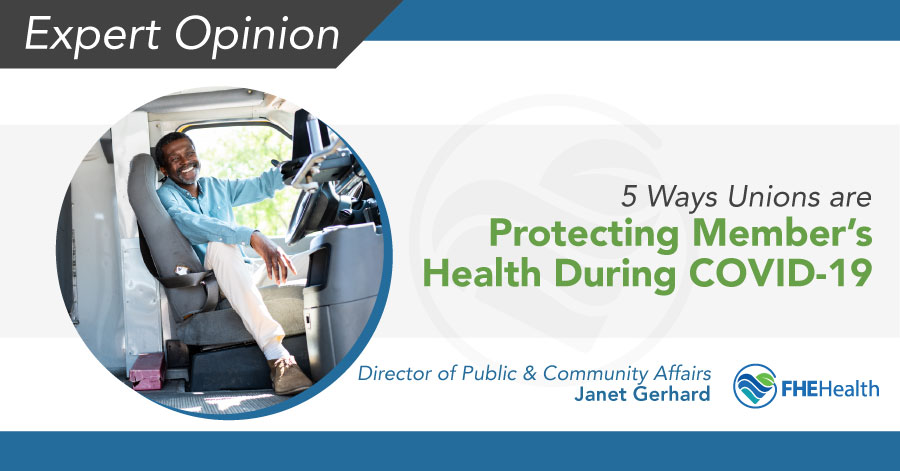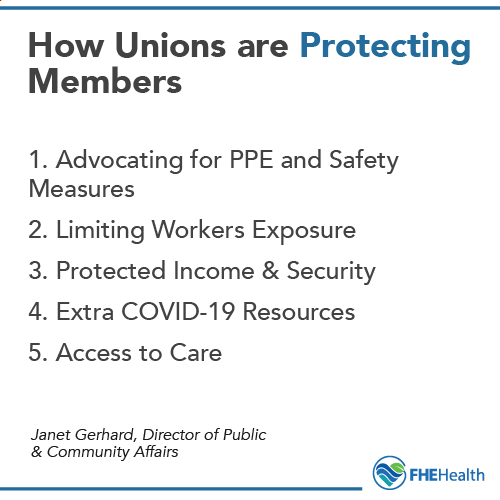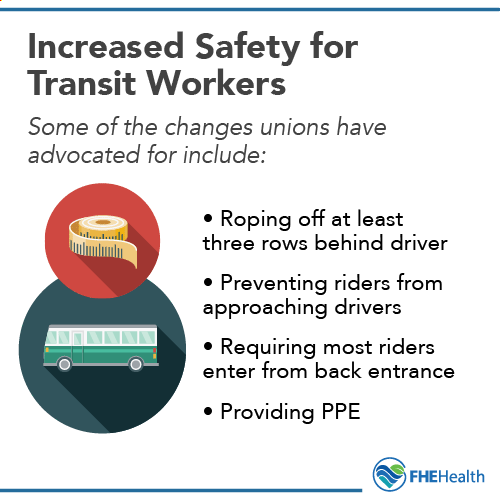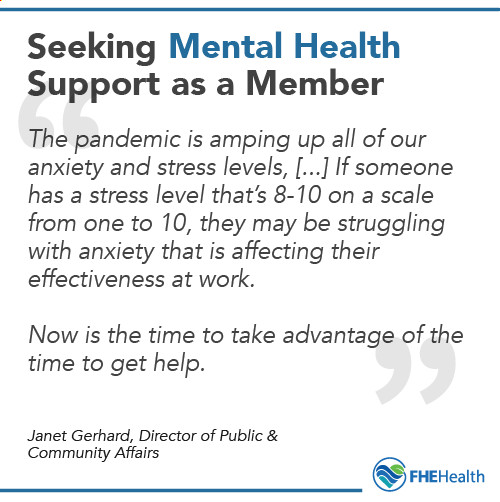
This article has been reviewed for accuracy by our peer review team which includes clinicians and medical professionals. Learn more about our peer review process.
Sometimes it takes a pandemic to reveal the many benefits of joining a union. In effect, the Coronavirus has highlighted the critical function that unions fulfill in protecting the health and safety of America’s workforce. Prior to the Coronavirus outbreak, unions had been on the decline in this country. Now, what unions are doing for COVID-19 may be changing that trend—and, may even point to how unions are inspiring a whole new labor movement.
A case in point: transit unions. The ways that transit unions are protecting their members’ health speak to the added health-and-safety protections that union membership can provide, according to expert Janet B. Gerhard. As Director of Public Affairs for the national addiction and mental health treatment provider FHE Health, Gerhard regularly interfaces with unions as a treatment resource for members and their families. In a recent interview, she talked about how unions are responding to the impact of COVID-19, by taking successful measures to protect the health and safety of their members. One result, she said, is that “unions are seeing a surge in membership”—and for good reasons.
The Impact of COVID-19 on Transit Workers – How Unions Have Responded
 COVID-19 has hit transit workers especially hard. The urgent need for more health protections became evident early on during the Coronavirus outbreak, when bus drivers, subway workers, and other public transportation personnel began to contract and die from the virus. In mid-April 2020, the COVID-19 mortality rate among this vulnerable population of America’s workers was reportedly more than triple the combined mortality rates of the New York City police and fire departments.
COVID-19 has hit transit workers especially hard. The urgent need for more health protections became evident early on during the Coronavirus outbreak, when bus drivers, subway workers, and other public transportation personnel began to contract and die from the virus. In mid-April 2020, the COVID-19 mortality rate among this vulnerable population of America’s workers was reportedly more than triple the combined mortality rates of the New York City police and fire departments.
Such statistics point to the extremely high risks of infection that transportation workers face when they’re without proper protections, as well as the extreme, chronic stress and mental health toll that accompany these health dangers. When left to address these issues on their own, or to take them up with an employer, individual workers have virtually no voice or power to change their circumstances and are more subject to retaliation when they do speak up.
A union, on the other hand, gives you “a collective voice, the strength of other people, a network of responsibilities—and that solidarity means something,” Gerhard said. She pointed to the following ways that transit unions have made their voice heard in securing much-needed health and safety protections for their members:
1. More personal protection elements (PPE) and stricter social distancing measures
 When states first began to offer free public transportation during the Coronavirus pandemic, the move prompted more people experiencing homelessness to use these services all day long—and, to increase transit workers’ exposure and susceptibility to COVID-19. Riders who could not wash their hands (and are themselves more vulnerable to infection) were not keeping a safe distance from transit workers and sometimes blatantly violating recommended safety guidelines.
When states first began to offer free public transportation during the Coronavirus pandemic, the move prompted more people experiencing homelessness to use these services all day long—and, to increase transit workers’ exposure and susceptibility to COVID-19. Riders who could not wash their hands (and are themselves more vulnerable to infection) were not keeping a safe distance from transit workers and sometimes blatantly violating recommended safety guidelines.
In one particularly egregious case, a mentally ill person reportedly announced they had COVID-19 and spit on a bus driver. Within days, the driver contracted the virus and later died. Meanwhile, drivers enjoyed few if any real protections in the way of social distancing measures. For example, only the very front-row seat behind the driver’s seat was initially roped off to create social distance.
Within quick time, many unions recognized the insufficiency of such measures and worked to increase workers’ protections and the safety of their working conditions, by:
- Roping off at least three rows of seats behind drivers, after successfully lobbying state governments
- Securing a protective chain from management that keeps riders from approaching drivers
- Requiring any ambulatory bus rider to enter from the back entrance rather than the front
- Requiring gloves, hand sanitizer, and masks for members and resourcing them with these protections when possible, upon request
- Requiring that riders carry travel cards
Of course, such measures and unions’ success in achieving them have varied on a state-by-state basis. Some states have been quicker to implement unions’ requests. Even so, the fact that unions are taking these initiatives before management and state and local governments speaks to the important need they fulfill in protecting workers’ health and safety.
2. Limiting workers’ on-the-job exposure to COVID-19
In the meantime, unions also successfully secured reduced work hours for their members. The resulting three-day-on, three-day-off schedule, lowers workers’ duration of exposure to the virus while also ensuring they can continue to get the same full-time income.
3. Protected income and job security
Protected income and job security are of course another key health protection—at any time. Research has shown, for example, that rates of suicide in the U.S. follow the same general trend on a graph as rates of unemployment. Bluntly put, when a person loses their job, they are more likely to become depressed and commit suicide. By successfully protecting members’ income, unions are thereby also protecting members’ mental health. (Gerhard said “hazard pay is the next goal,” the idea being that essential workers on the frontlines of COVID-19 should get a pay raise.)
4. Extra COVID-19 resources and guidelines for their members, including free online mental health and stress coping tools
Gerhard noted that many transit workers and their families are dealing with feelings of grief and anxiety, after seeing friends and colleagues become infected and/or die from the Coronavirus; and she commended unions for how they are making additional resources and supports available to their members—as yet another health perk that comes with their monthly union fee (usually only several dollars).
Gerhard herself has attended many online funeral services for transit workers who have succumbed to COVID-19 in recent weeks, and she and FHE Health have been partnering with transit unions to support members with weekly, video-recorded tips for managing grief in a time of social distancing, anxiety management techniques, and other stress coping skills. These extra supports are exclusive to union members.
5. Streamlined access to quality addiction and mental health treatment and referrals
 Yet another health benefit of union membership is the reassurance of being able to have personalized and confidential mental health advice, support, and referrals through close health partners. Gerhard said many workers have called her for help accessing inpatient treatment and telehealth services during the Coronavirus outbreak, and she has been able to refer them to trusted treatment options.
Yet another health benefit of union membership is the reassurance of being able to have personalized and confidential mental health advice, support, and referrals through close health partners. Gerhard said many workers have called her for help accessing inpatient treatment and telehealth services during the Coronavirus outbreak, and she has been able to refer them to trusted treatment options.
“The pandemic is amping up all of our anxiety and stress levels,” Gerhard said. “If someone has a stress level that’s 8-10 on a scale from one to 10, they may be struggling with anxiety that is affecting their effectiveness at work.
The message that Gerhard wants them to hear is this: “Now is the time to take advantage of the time to get help.”
She emphasized that some things haven’t changed for transit workers who may be facing mental health issues: The same mental health infrastructure is in place for ensuring excellent care; and, the same legal provisions and processes are also, granting employer confidentiality and job protections for time spent in rehab.
In these five ways, transit unions are going the extra mile to protect their members’ health. Together, these additional health-and-safety supports to make a strong case for why any transit worker not in a union should consider joining one today.






